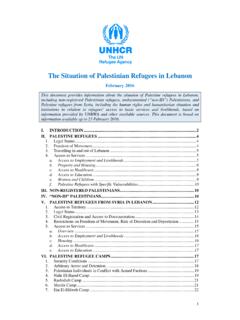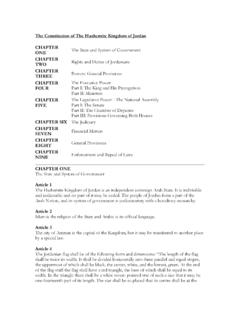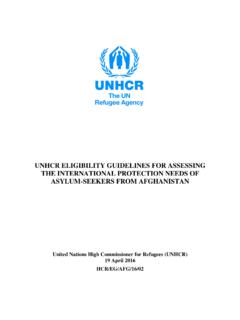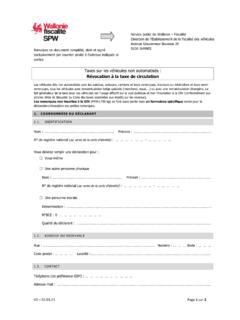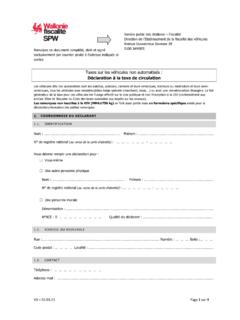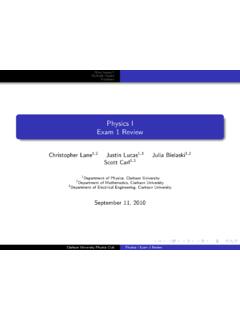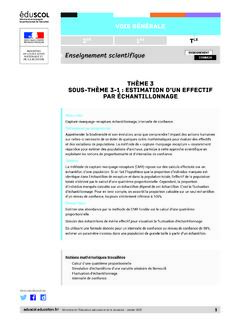Transcription of Clans in Somalia - Refworld
1 Clans in SomaliaReport on a Lecture by Joakim Gundel, COI Workshop Vienna, 15 May 2009 (Revised Edition) published December 2009 ACCORD is co-funded by the European Refugee Fund, UNHCR, and the Austrian Federal Ministry of the Interior. This report is based on a presentation by Dr. Joakim Gundel1 during the COI (Country of Origin Information) Workshop Clans in Somalia organised by ACCORD on 15 May 2009 in Vienna, as well as on written notes provided by Mr. Gundel. All information, if not referenced otherwise, is drawn from Mr.
2 Gundel s contributions to the workshop. The final report was prepared by ACCORD and cleared with the expert. This report is not, and does not purport to be fully exhaustive with regard to the issues covered, nor is it conclusive as to the merits of any particular claim to refugee status or asylum. The views and opinions stated in this report do not represent an opinion of ACCORD. ACCORD, however, holds responsibility for style and form of the report. Note on the present revised edition: The present revised edition of the report replaces the previous edition published 31 August 2009.
3 For this revised version, parts of chapters 4 and 5 (specifically those concerning the Yibr, Rer Hamar, Sheikhal, and Asharaf groups) have been corrected and supplemented at Dr. Gundel's request, based on his written comments. Please note that the use of the 31 August 2009 edition of the report is no longer authorised. An electronic version of this report is available on 15 December 2009 Editor: Daisuke Yoshimura (ACCORD) ACCORD Austrian Centre for Country of Origin & Asylum Research and Documentation Austrian Red Cross Wiedner Hauptstra e 32 A- 1040 Vienna Austria Phone: +43 1 58 900 582 Fax: +43 1 58 900 589 E-Mail: Web: 1 Dr.
4 Joakim Gundel is a political analyst specialised in complex emergencies, with a focus on Somalia . He has been conducting research and travelling in Somalia since 1998 and works as a freelance consultant for UN and other international humanitarian agencies in Somalia . He also has a background in immigration work with the Danish Immigration Service. He is the author of the 2006 report The predicament of the Oday commissioned by the Danish Refugee Council for which he did extensive field research travelling from northern to southern Somalia , meeting with traditional elders.
5 2 Table of Contents I. General 5 1. Overview of the Political Situation in South-Central 2. Somali traditional Segmentary lineage system / clan Clan Mag-paying Evolution of the Clan Customary laws (xeer)..9 Traditional authorities / juridico-political II. Clans and 11 3. Nomadic groups:..12 Agro-pastoralist 4. Ethnic minority 5. Minority and other groups with affiliations to major 17 III. 6. State 7. Clan Background: Power structures and revenge Forms of clan Clan protection in the light of the current 8.
6 Internal Flight / Relocation IV. Selected V. 3 List of Abbreviations ARS - Alliance for Re-liberation of Somalia FPENS - Formal Private Education Network in Somalia GNU - Government of National Unity IDP Internally Displaced Person SCS South-Central Somalia TFG - Transitional Federal Government UIC - Union of Islamic Courts (also: ICU, Islamic Courts Union) UNHCR - United Nations High Commissioner for Refugees USC - United Somali Congress Map of Somalia University of Texas Perry-Castaneda Library Map Collection.
7 Somalia (Political), 2002 4I. General Information 1. Overview of the Political Situation in Somalia Somalia remains in a condition of internal conflict, fragmentation, and complex political humanitarian emergency. The partial exemptions are Somaliland and Puntland in Northern Somalia . Somaliland The Republic of Somaliland is a region located in the north-western part of Somalia , bordering Ethiopia, Djibouti, and the Gulf of Aden. It declared its independence unilaterally in 1991 but has not been recognised by the international community as an independent state.
8 From 1997, the last conflicts within and between the Clans were solved. Since then, Somaliland has been characterised by relative stability and rudimentary but functioning governmental institutions, and a hybrid democratic political system. The legislative is composed of a House of Elders and a House of Representatives. Democratic elections have been held at presidential, parliamentary, and local district levels. At present, Somaliland has a 3-party political system. Somaliland does not regard itself as a clan-based state, and its borders reflect its former colonial boundaries ( of what was British Somaliland), and not clan borders.
9 Somaliland thus includes Clans that may be relevant elsewhere if it were a clan-based state. Puntland Puntland is a region in the north-eastern part of Somalia and declared itself an autonomous state in 1998. Puntland is less stable than Somaliland, but has carried out a peaceful transition of government and President in 2005 and 2009, and is showing signs of trying to tackle its internal security issues which include the widespread piracy along its coastline. In contrast to Somaliland, Puntland is very much a clan-based administration, primarily based on the Majerteen clan, and is thus disputing some of the territory inside Somaliland inhabited by Clans that belong to the same family as the Majerteen.
10 South-Central Somalia In contrast to Somaliland and Puntland, South Central Somalia is caught up in a more complex conflict than ever as the clan-based political factional rivalry and warlordism is now compounded by fragmented Islamic-based factionalism. 5 When the Transitional Federal Government (TFG) was established in 2004 following the 14th attempt to create peace in Somalia , the expectation was that peace and normalcy would gradually return and governmental institutions would begin to develop.





